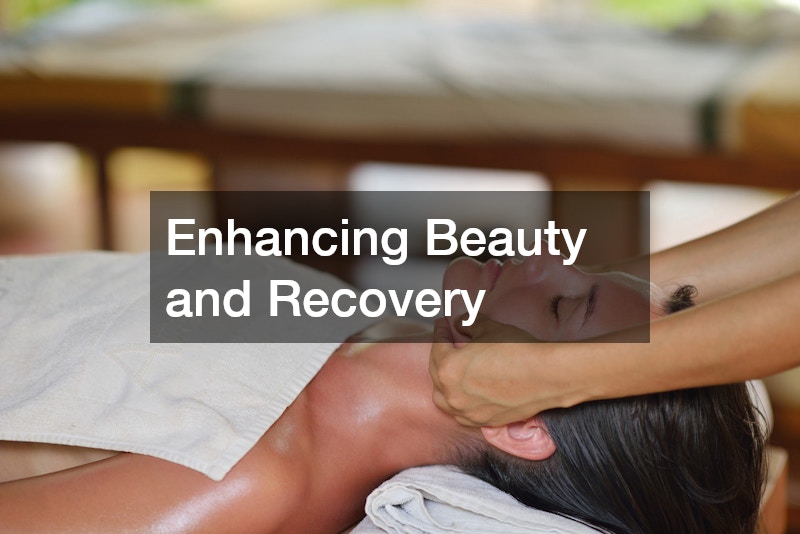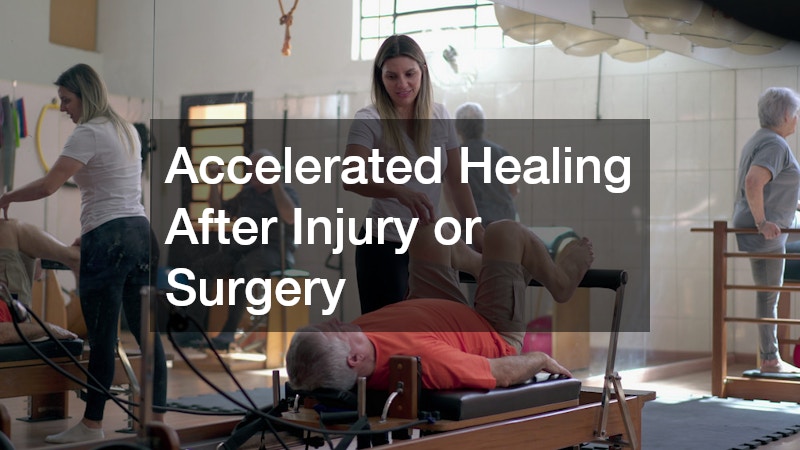The concept of well-being has gained significant attention in recent decades. Individuals are increasingly recognizing the need to prioritize their health and adopt practices that enhance recovery and improve overall wellness. The idea of a “recovery week” has emerged as a popular strategy to focus dedicated time on healing and rejuvenation. During this period, individuals engage in various holistic practices tailored to their specific needs, making it a crucial component of a sustainable lifestyle.
This article explores the multifaceted approach to a recovery week, delving into the diverse therapies and services that contribute to physical, mental, and emotional well-being. By providing insights into these options, this comprehensive guide aims to empower individuals to take charge of their health, prioritize self-care, and invest in well-being journeys that foster a balanced and fulfilling life.
A Holistic Hub for Healing
Embracing the concept of a recovery week means immersing oneself in an environment conducive to healing, making a wellness center an ideal destination. Such centers offer a range of facilities and services designed to address diverse health concerns and promote overall well-being. From nutritional counseling to mindfulness practices, these centers provide personalized experiences that cater to individual wellness goals.
Integrating a variety of healing modalities, wellness centers emphasize the importance of a balanced and comprehensive approach to health. Participants can immerse themselves in activities such as yoga, meditation, and fitness programs that cater to different levels of ability and interest. These practices not only rejuvenate the body but also calm the mind, encouraging a deeper connection between the physical and mental aspects of well-being.
The emphasis of wellness centers on community and support is instrumental to a successful recovery plan. Engaging with others on similar wellness journeys fosters a sense of connection and motivation, aiding individuals in their pursuit of well-being. From group workshops to one-on-one consultations, these interactions provide valuable insights and inspiration, ensuring that every individual’s path to recovery is both fulfilling and sustainable.

Balancing the Body From Within
Hormone replacement therapy (HRT) emerges as a crucial element in recovery for aging populations, as it addresses the intricate balance of hormones essential for optimal health. By restoring hormone levels to their natural state, HRT alleviates symptoms such as fatigue, mood swings, and diminished vitality. This therapeutic approach is particularly beneficial for individuals experiencing imbalances due to aging or medical conditions, offering a pathway to enhanced quality of life.
Individuals may explore HRT to not only address physical concerns but also improve mental and emotional well-being. The therapy is closely monitored by healthcare professionals who tailor treatments to individual needs, ensuring both safety and efficacy. As part of a comprehensive wellness plan, HRT helps individuals regain balance and resilience, contributing to overall health and vitality.
In addition to HRT, recovery may involve nutritional guidance and lifestyle adjustments aimed at supporting hormone balance. A well-rounded approach that includes dietary changes, exercise, and stress management complements the effects of hormone replacement therapy. These combined efforts empower individuals to take control of their health, equipping them with the tools necessary for sustained well-being long after recovery week concludes.
Restoring Strength and Mobility
A cornerstone of recovery week is the focus on restoring physical strength and mobility, often facilitated by a physical therapy rehab center. These centers offer specialized programs designed to aid recovery from injuries, surgeries, or chronic conditions. Through personalized therapy sessions, individuals work toward regaining strength, improving flexibility, and enhancing overall physical performance.
The role of a physical therapy rehab center in bodily recovery extends beyond simple exercise routines. Therapists employ various techniques such as manual therapy, targeted exercises, and advanced modalities to address specific needs. This personalized approach ensures that each individual’s recovery plan is tailored to facilitate optimal outcomes, fostering a swift and effective healing process.
In addition to physical rehabilitation, these centers emphasize education on injury prevention and long-term health maintenance. By equipping individuals with knowledge and skills, recovery becomes an empowering experience that promotes self-reliance and confidence. This comprehensive approach to physical recovery not only alleviates pain and dysfunction but also enhances the individual’s overall quality of life.
Breathing Better, Living Better
Pulmonary rehab plays a pivotal role in enhancing respiratory health, particularly for individuals suffering from chronic respiratory conditions. Pulmonary rehab encompasses a multidisciplinary approach that combines medical, educational, and therapeutic interventions to optimize lung function and improve quality of life.
Focused on tailored exercise programs, breathing techniques, and lung health education, pulmonary rehab aims to increase physical endurance and reduce respiratory symptoms. Individuals learn to manage their conditions effectively, resulting in decreased hospital visits and an improved sense of well-being. This aspect of recovery highlights the importance of addressing respiratory health as a vital component of overall wellness.
Supportive care and guidance provided during pulmonary rehab are integral to the recovery experience. With a team of healthcare professionals, individuals receive personalized attention and encouragement, fostering an environment conducive to healing and progress. The knowledge and skills acquired during this period empower participants to adopt lasting lifestyle changes, ensuring continued respiratory health long after the recovery week ends.
The Power of Water in Recovery
The therapeutic properties of water offer a myriad of benefits, making it an effective component in rehabilitation programs. Aquatic therapy is increasingly popular as a unique and natural method of physical healing. Buoyancy and resistance inherent in aquatic therapy allow for low-impact exercises that facilitate strength enhancement and pain reduction.
Participants in aquatic sessions benefit from the supportive nature of water, which aids in improving range of motion, enhancing flexibility, and alleviating joint stress. Aquatic therapy is particularly advantageous for individuals with mobility challenges, as it provides a safe and comfortable environment for rehabilitation.
The development of customized programs within aquatic therapy ensures that each individual’s specific needs and goals are addressed. During recovery week, these water-based sessions not only promote physical healing but also instill a sense of relaxation and tranquility. This combination of physical and mental benefits underscores the holistic nature of bodily recovery, highlighting the diverse avenues available to individuals on their journey to health and wellness.

Enhancing Beauty and Recovery
Incorporating med spa services into a recovery plan provides individuals with an opportunity to focus on enhancing their aesthetic well-being. Med spas combine traditional spa services with medical-grade treatments, offering a wide range of options to rejuvenate the skin, hair, and body.
Popular med spa services that complement physical restoration include facials, dermal fillers, and laser treatments. These services not only enhance physical appearance but also contribute to emotional well-being by boosting confidence and self-esteem. Participants are encouraged to explore these treatments as part of their approach to recovery and rejuvenation.
The expertise of trained professionals ensures that med spa services are delivered with the highest standards of safety, effectiveness, and personalization. Each individual receives customized treatments designed to meet their specific needs, transforming the space into a sanctuary of healing, renewal, and self-care. By incorporating med spa services into recovery week, participants benefit from an all-inclusive experience that nurtures both body and spirit. These rejuvenating therapies help accelerate recovery, reduce stress, and enhance overall well-being.
Aligning for Optimal Function
Chiropractic care is often a fundamental component of physical recovery, focusing on restoring alignment and function of the musculoskeletal system. By addressing spinal misalignments, chiropractic adjustments alleviate pain, enhance mobility, and promote overall well-being.
During recovery week, individuals experience the benefits of chiropractic care as part of an integrative healing process. Tailored adjustments address specific issues such as back pain, neck discomfort, and joint stiffness. This non-invasive approach complements other therapies, creating a holistic pathway to optimal health.
The personalized nature of chiropractic care ensures that treatments are tailored to each individual’s unique needs and health goals. It not only provides immediate relief from symptoms but also supports long-term wellness by addressing the root causes of discomfort. Chiropractic care empowers individuals to maintain proper alignment and optimal function, fostering a sustained state of balance, vitality, and resilience. This inclusive approach encourages proactive self-care and a deeper connection to one’s overall well-being.

Accelerated Healing After Injury or Surgery
A key aspect of recovery week is the focus on accelerated healing following injury or surgery, often necessitating short-term rehab programs. These programs are designed to facilitate quick and effective recovery, reducing downtime and enabling individuals to resume daily activities with renewed vigor.
Short-term rehab incorporates a range of therapeutic modalities, including physical therapy, occupational therapy, and pain management strategies. This comprehensive approach addresses physical challenges, ensuring a well-rounded recovery process. Individuals benefit from personalized care plans that adapt to their unique circumstances and requirements.
Through targeted exercises, skill-building activities, and pain management techniques, short-term rehab significantly enhances the recovery experience. Participants gain confidence in their abilities and are equipped with strategies to maintain progress after treatment is over. This focus on accelerated healing underscores the importance of quick and effective care in the journey toward wellness.
Supporting Recovery After Neurological Setbacks
Neuro rehab is a vital element of recovery for individuals overcoming neurological setbacks. This specialized form of rehabilitation focuses on restoring function and quality of life for those affected by conditions such as stroke, traumatic brain injury, or multiple sclerosis.
The multidisciplinary nature of neurorehabilitation integrates physical, occupational, and speech therapies to address a wide range of individual needs and recovery goals. Recovery week participants engage in intensive, targeted interventions that enhance both cognitive and physical function, contributing to overall well-being and quality of life. Individuals also partake in neuro-enhancement activities and exercises specifically designed to stimulate brain plasticity, improve daily functioning, and build sustainable progress.
These interventions, combined with compassionate guidance from a collaborative team of professionals, foster resilience, confidence, and a renewed sense of autonomy. This immersive approach not only accelerates healing but also helps participants reconnect with their strengths and envision new possibilities in their recovery journey.
Oral Health as a Pillar of Well-Being
Perhaps less intuitively, general dentistry plays an essential role in many recovery plans, underscoring the significance of oral health as a foundation for overall wellness. Dental care encompasses preventive, restorative, and cosmetic services that enhance oral hygiene and address a spectrum of dental concerns.
Reputable dentistry services provide individuals with an opportunity to prioritize dental health through routine check-ups, cleaning, and necessary treatments. By maintaining optimal oral health, individuals reduce the risk of dental ailments and support overall systemic health.
Preventive dental care and education during recovery week ensure individuals adopt habits that promote long-term oral hygiene. This focus on general dentistry is integral to a comprehensive approach to well-being, empowering individuals to achieve a healthy smile and contribute to their overall health journey.
Recovery week is far more than a temporary pause from life’s demands—it is an intentional recalibration of the body, mind, and spirit. As explored throughout this comprehensive guide, the journey to wellness is not confined to a single path but instead unfolds through a multifaceted approach that addresses the unique needs of each individual.
Each therapeutic modality outlined in this article plays a distinct role in promoting overall well-being, yet they are all interconnected by a shared purpose: restoring balance and enhancing quality of life. By incorporating both evidence-based medical treatments and holistic wellness practices, recovery becomes a personalized experience that nurtures the whole person. From strengthening physical mobility and revitalizing respiratory function to boosting self-esteem and safeguarding oral health, every component contributes to a broader sustainable wellness journey.
Perhaps most importantly, recovery week empowers individuals to take ownership of their health. It encourages proactive self-care, self-awareness, and the pursuit of lasting lifestyle changes. The immersive, supportive settings, whether at a wellness center, rehab facility, or med spa, foster not just physical improvement but also a renewed sense of purpose, motivation, and community.
As modern life continues to challenge our energy and resilience, carving out time for a structured recovery becomes an essential act of self-preservation. It is not a luxury, but a necessity—one that reaffirms our commitment to living fully, aging vibrantly, and thriving with intention. When we invest in recovery, we invest in a future of greater vitality, emotional clarity, and holistic health.






